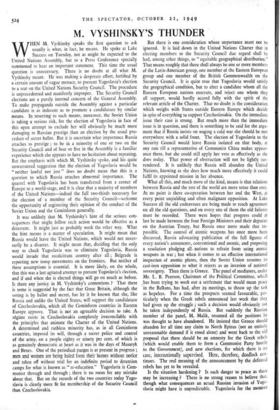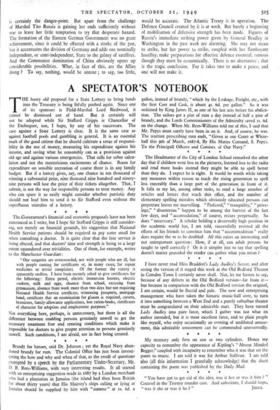M. VYSHINSKY'S THUNDER
WHEN M. Vyshinsky speaks the first question to ask usually is what, in fact, he means. He spoke at Lake Success on Tuesday, not as might be expected to the United Nations Assembly, but to a Press Conference specially summoned to hear an important statement. This time the usual question is unnecessary. There is no doubt at all what M. Vyshinsky meant. He was making a desperate effort, fortified by a certain amount of vague menace, to prevent Yugoslavia's election to a seat on the United Nations Security Council. The procedure is unprecedented and manifestly improper. The Security Council elections are a purely internal concern of the General Assembly. To make propaganda outside the Assembly against a particular candidate is as indecent as to promote a candidature by similar means. In resorting to such means, moreover. the Soviet Union is taking a serious risk, for the election of Yugoslavia in face of this open attempt to exclude her will obviously be much more damaging to Russian prestige than an election by the usual pro- cedure of secret ballot. But it is uncertain what importance Russia attaches to prestige ; to be in a minority of one or two on the Security Council and of four or five in the Assembly is a familiar experience which she appears to have no hesitation about repeating. But the emphasis with which M. Vyshinsky spoke, and his quite unwarranted suggestion that the election of Yugoslavia would be "neither lawful nor just" does no doubt mean that this is a question to which Russia attaches abnormal importance. The quarrel with Yugoslavia has been transferred from a corner of Europe to a world-stage, and it is clear that a majority of members of the United Nations—indeed the full two-thirds necessary for the election of a member of the Security Council—welcome the opportunity of registering their opinion of the conduct of the Soviet Union and the Cominform generally.
It was unlikely that M. Vyshinsky's hint of the serious con- sequences that might follow such action would be effective as a deterrent. It might just as probably work the other way. What the hint means is a matter of speculation. It might mean that Russia would leave the United Nations, which would not neces- sarily be a disaster. It might mean that, deciding that the only way to check Yugoslavia was to eliminate Yugoslavia, Russia would invade that recalcitrant country after all ; Belgrade is reporting new troop movements on the frontiers. But neither of these assumptions is essential. It is more likely, on the whole, that this was a last agitated attempt to prevent Yugoslavia's election, and if and when she is elected things will go on much as before. Is there any justice in M. Vyshinsky's contentions ? That there is some is suggested by the fact that Great Britain, although the voting is by ballot and secret, has let it be known that she, like Russia and unlike the United States, will support the candidature of Czechoslovakia, which all the Cominform countries in Eastern Europe approve. That is not an agreeable decision to take. A regime exists in Czechoslovakia completely irreconcilable with the principles that animate the Charter of the United Nations. A determined and ruthless minority has, as in all Cominform countries, imposed its will, through a secret police and control of the army, on a people eighty or ninety per cent. of which is as genuinely democratic at heart as it was in the days of Masaryk and Benes. One of the periodical purges is at present in progress ; men and women are being haled from their homes without notice and taken off without trial for an indefinite period to detention camps for what is known as "re-education." Yugoslavia is Com- munist through and through ; there is no room for any mistake about that. But on the records of the two countries today Yugo- slavia is clearly more fit for membership of the Security Council than Czechoslovakia. But there is one consideration whose Importance must not be ignored. It is laid down in the United Nations Charter that in electing members to the Security Council due regard shall he had, among other things, to "equitable geographical distribution." That means roughly that there shall always be one or more members of the Latin-American group, one member of the Eastern European group and one member of the British Commonwealth on thc Security Council. It is quite true that Yugoslavia would satisfy the geographical condition, but to elect a candidate whom all the Eastern European nations execrate, and reject one whom they all support, would hardly accord fully with the spirit of the relevant article of the Charter. That no doubt is the consideration which weighs with States outside Eastern Europe which decide in spite of everything to support Czechoslovakia. On the immediate issue their case is strong. But much more than the immediate issue is in question, and there is something to be said for the argu- ment that if Russia insists on waging a cold war she should be met everywhere with a solid front. The election of Yugoslavia to the Security Council would leave Russia isolated on that body, at any rate till a representative of Communist China makes appear- ance there, but she could still apply her veto as effectively as she does today. That power of obstruction will not be lightly sur- rendered. It is unlikely that Russia will abandon the United Nations, knowing as she does how much more effectively it could fulfil its appointed mission in her absence.
What all this, and much more of the kind, means is that relations between Russia and the rest of the world are more tense than ever. At no point is there co-operation between her and the West, at every point unyielding and often malignant opposition. At Lake Success all the old endeavours are being made to reach agreement on all the old questions, and on every one of them the old failures must be recorded. There were hopes that progress could at last be made between the four Foreign Ministers and their deputies on the Austrian Treaty, but Russia once more made that im- possible. The control of atomic weapons has once more been discussed, Russia advocating publication of the full figures of every nation's armaments, conventional and atomic, and proposing a resolution pledging all- nations to refrain from using atomic weapons in war ; but when it comes to an effective international inspection of atomic plants, then the Soviet Union resumes its cast-iron opposition to what it rejects as an invasion of national sovereignty. Then there is Greece. The panel of mediators, under Mr. L. B. Pearson, Chairman of the Political Committee, which has been trying to work out a settlement that would mean peace in the Balkans, has had, after 29 meetings, to throw up the task as hopeless. For a time the prospects seemed favourable, par- ticularly when the Greek rebels announced last week that they had given up the struggle ; such a decision would obviously not be taken independently of Russia. But suddenly the Russian member of the panel, M. Malik, resumed all the positions he was thought to have abandoned. He insisted that Greece should abandon for all time any claim to North Epirus (not an entirely unreasonable demand if it stood alone) and went back to the old proposal that there should be an amnesty for the Greek rebels (which would enable them to form a Communist Party hostile to the Government), and new elections, for which there is no case, internationally supervised. Here, therefore, deadlock con- tinues. The real meaning of the announcement by the defeated rebels has yet to be revealed. Is the situation hardening ? Is such danger to peace as there may be increasing ? There is no strong reason to believe that, though what consequences an actual Russian invasion of Yugo- slavia might have is unpredictable. Yugoslavia for the moment



































 Previous page
Previous page